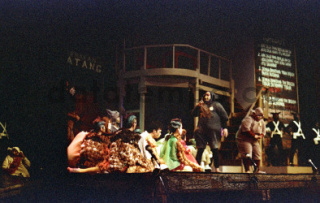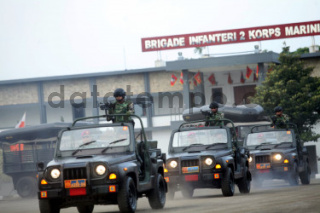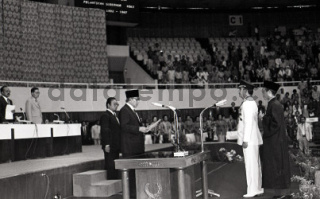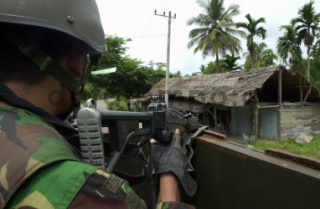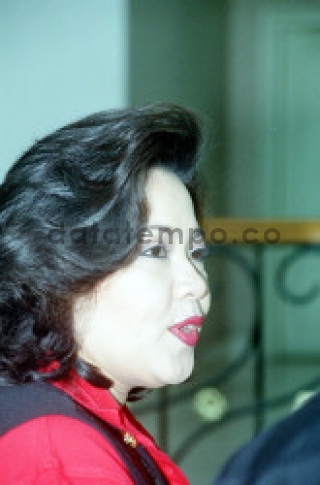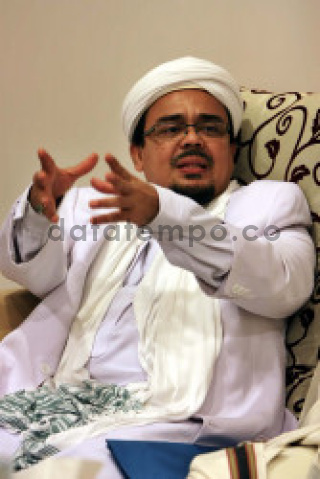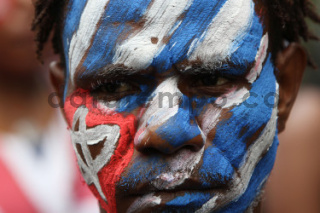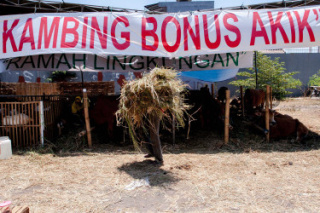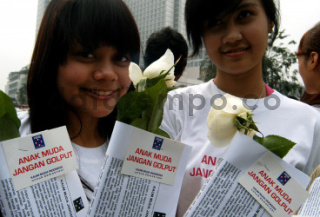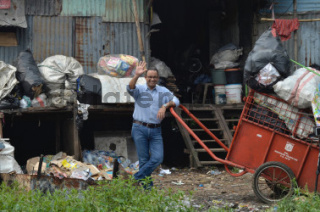Brunei Darussalam In Profile
Edisi: 30/18 / Tanggal : 1988-09-24 / Halaman : I / Rubrik : PWR / Penulis :
In 1521 the Italian historian Antonio Pigafetta visited the Sultanate of Brunei. He described the Sultanate as a rich, hospitable and powerful kingdom with an established Islamic Monarchy and strong regional influence in the Java and Borneo archipelago.
Today, almost five centuries later, a modern-day visitor would find much in common with that description by Pigafetta. Brunei is a wealthy country with one of the highest per capita incomes in the world, a well-established Islamic Monarchy true to its traditions, and a country which plays an important role in the affairs of its region.
Brunei is situated on the North-West end of the island of Borneo and has a total area of 5,765 square kilometres. It has a common border with Sarawak, one of the constituent states making up the Federation of Malaysia.
The country is mainly jungle with tropical forests covering about 70 percent of the area. Brunei is divided into four districts -- Brunei/Muara, Tutong, Belait and Temburong. The coastline extends for about 161 kilometres along the South China Sea.
The people of Brunei are mainly Malay and that language is the official one of the State English is widely spoken and is also used in the education system. The country's estimated population is around 226,000. Malays make up around 155,000 and the Chinese 41,000. The non-Malay indigenous peoples, mainly Dusuns and Ibans, who live in the interior make up 11, 500. There are around 18,000 expatriates from Europe and elsewhere working in Brunei including guest workers from other South East Asian countries, notably Malaysia and the Philippines.
A Short History
The Brunei Sultanate rose to prominence in the 15th and 16th centuries when the country extended throughout Borneo and as far north as the Philippines.
This golden age centred on two remarkable rulers. Sultan Bolkiah V and Sultan Hassan under their rule the Royal Court developed a splendour and ritual on a par with that of anywhere in the world and the territorial and religious influence of the country reached its peak.
In 1847, the close relationship between Britain and Brunei was first formalised with a treaty for the improvement of trade relations and for both states to co-operate in the suppression of piracy.
In 1888, North Borneo became a British protectorate and Brunei became a British protected state in 1906, Brunei accepted a further measure of British control with executive power going to a British Resident whose duty was to advise the ruler on all matters, except those concerning local customs and religion.
Brunei was to remain under this Residency agreement until 1959, when a larger measure of domestic internal rule was granted by Constitutional agreement by that year. In 1971, full internal sovereignty was resumed and in 1984 the country resumed full political sovereignty with responsibility for its own external affairs and defence.
Three key points need to be remembered about this stage in Brunei's history.
- Brunei was never a colony and unlike its neighbours in South East Asia it did not experience a complete loss of sovereignty. In any event the British rule in Malaya was through the local sultans and consequently differed from the British colonial administration elsewhere.
- During the whole period there was continuity within the ruling family, one of the worlds oldest dynasties, and loyalty to the Sultan remained the cornerstone of Bruneian politics in the protectorate period.
- The involvement with Britain saw close links develop betweeen the two countries and at the same time Brunei was influenced by English Common Law, education and economic development. The Brunei of the 1980s with its mixture of Islamic culture sophisticated economic development and English Common Law framework, was deeply influenced by this period.
Modern Brunei's political history centres on the constitutional changes that Brunei has seen in 1959, 1971 and 1984. Brunei has evolved into a full sovereign state playing an active role both in world politics and in international economic affairs.
Two men have dominated modern-day Brunei -- the 29th Sultan, His Majesty The Sultan and Yang Di-Pertuan. Sultan Haji Hassanal Bolkiah Mu'izzaddin Waddaulah who has ruled since 1967. and His Majesty's father the 28th ruler Sultan Haji Omar Ali Saifuddien who was Sultan from 1950 to 1967 Between them they have led Brunei into full Sovereignty and improved social conditions dramatically, while retaining tradition and stability.
The post-war period saw rapid and sustained expansion of Brunei's gas and oil industries, with a consequent increase in the country's infrastructure. A key fact in this development was a sound monetary and fiscal policy, without any excessively ambitious development projects.
The most unfortunate event in the postwar years was an armed rebellion in December 1962, organised from outside the State This did not enjoy popular support and was soon quelled by loyal forces. Since that time the country has known internal peace.
In 1984, Brunei resumed full sovereign status and took over responsibility for its own defence and foreign affairs from the United Kingdom. The country joined the United Nations, the Association of South East Asian Nations and the Organisation of the Islamic Conference. Today, Brunei is part of the community of nations conscious of its long history and the need to adapt to change.
The National Development Plan
Brunei's economy is dominated by the oil and liquefied natural gas industries and Government expenditure patterns. The Brunei Government is well aware of the inherent long-term problems caused by such a pattern and accordingly a series of national development plans have been implemented for the past twenty years.
The main aim of the Fifth National Development Plan 1986-1990 is to build up a more diversified economy Previous national plans have been more concerned with improving the infrastructure.
The current National Plan has nine objectives. These are: 1. To improve the quality of life of the people. 2. To maximise the use of natural resources. 3. To develop new export orientated industries. 4. To accelerate human resources development so as to meet the country's demand for an increasingly sophisticated economy. 5. To maintain full employment and increase the level of productivity. 6. To maintain a moderate rate of inflation. 7. To foster a dynamic, disciplined and responsible society with its citizens as agents for progress and development. 8. To encourage and nurture the development of Malays as leaders of industry and commerce. 9. To have a clean and healthy environment.
Brunei's economy has performed well in the 1980s, although the macro-economic indicators are distorted by the depressing impact of the fall in oil prices during that period. Gross domestic product (GDP) per capita for the economy as a whole fell in the 1980s, following a dramatic 33.3 per cent growth rate in 1979 and a 67.4 per cent growth rate in 1980. This highlights the importance of oil and gas prices.
The non oil sector of the economy, particularly construction, has shown a healthy growth, with a boost in the infrastructure and a conscious move to diversify the economy which is the hallmark of the Government's economic planning. The fall in oil revenue has had no effect on living standards which have continued to improve steadily during the decade.
Finance
Brunei's financial power, monetary reserves and investment portfolio have been the subject of much international speculation and comment in recent years. In brief, financial policy in the Sultanate…
Keywords: -
Artikel Majalah Text Lainnya
MELANGKAH MAJU dengan KESUNGGUHAN HATI
1994-03-12Ekspor anak perusahaan surya dumai group ini sudah menjangkau ke 27 negara. pertumbuhan penjualan dan…
Yang dibutuhkan pelaku bisnis: Color Pages Indonesia
1994-03-26Segera terbit color pages indonesia. katalog tentang building materials dan equipments, dengan informasi yang lengkap…
BIARKAN KAMI MENYELESAIKAN MASALAH ANDA
1994-01-29Biro administrasi efek (bae) pertama di indonesia. memberikan jasa layanan bagi perusahaan yang akan dan…

